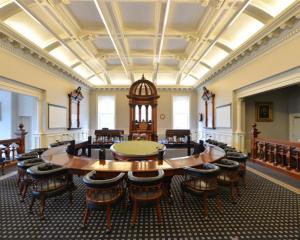Proposals for the Dunedin City Council to take over the control of the city's buses have emerged again, this time with Dunedin Mayor Dave Cull confirming he has had preliminary discussions with Otago Regional Council chairman Stephen Woodhead.
Previously, former regional council chairman, Stephen Cairns had advocated for city council control and discussion and debate had taken place. What has changed now is that the city has sold its bus operating arm, Citibus, removing a possible conflict of interest.
There is logic to city control.
Eliminated, for example, would be conflicting responsibilities for bus shelters, a cause of irritation and delay. The city also has other street-level functions and provides most of the hands-on basics around Dunedin.
Many residents simply incorrectly assume that, in fact, the buses are under the city's auspices. They might also not understand the contracting system where subsidised routes are tendered out to competing bus companies. But they are more likely to know who city councillors are because of their higher profile.
The city council, because of what it does, is closer to the community.
While one could make a weak case for bus control being related to the regional council's transport overview role, contracting bus routes is distinct from its core functions. It has also proved a thankless duty, with patronage having fallen while costs rise.
There are always specific demands for more and better services, and the promotion of public transport is a worthy cause especially among those with environmental and social concerns, including from many who never, or seldom, use the buses themselves.
The regional council ran the bus contracting system in a tight and frugal way until pressure rose sufficiently for it to increase the number of services and raise standards. A package of changes from November 2007, including the introduction of the successful Go Card, was followed by a substantial upward blip in patronage around 2008.
These changes were extensive and included 242 new services, changed timetables, a Mosgiel loop linking with Dunedin services, new shelters and "super-low floor accessible" buses for almost all urban routes. A campus and a city loop were trialled, and these failed after poor support.
Mandatory driving training was also introduced. But all this came at a hefty price, with the subsidy rising by millions of dollars. The transport rate in four years - 2006-07 to 2010-11 - for a $300,000 home rose from $27.45 to $47.70.
Because these rates are calculated by capital value, it is those who on the whole are least likely to use the buses, those in the most expensive houses, who pay most of the local subsidy. Nevertheless, bus users are expected to pay 50% of the costs of running the buses. Ratepayers and taxpayers find about a quarter each.
Despite the increased and improved services, patronage disappointingly fell in the two years after the initial 2008 rise.
Although two increases in prices would not have helped, even free buses - based on a experiment in Invercargill - will fail to discourage many Dunedin residents and commuters from the convenience of their cars. Parking, despite higher costs and more restrictions, remains relatively cheap and easily available as would be expected in a small city.
Petrol price rises have not been savage or consistent enough to discourage the use of private cars, and there is often an elitist attitude towards being seen on buses, despite the improvements in bus standards and services and innovations such as bike racks. Encouragingly, there has been a rise in patronage from March this year. But this will be difficult to sustain.
It was a brave council that included transport views in its latest major survey of citizens because it would now appear to be committed, in good faith, to exploring the option of controlling the buses. That survey "obviously signalled" a desire for a better service beginning with a transfer of responsibility for the network, Mr Cull said. Although there is much sense in a handover, one must wonder why the city would want to take on such a difficult challenge.
The chalice might not be poisoned but its contents may prove difficult to digest. Either transport rates will go up further to help pay for services, or the council will reject demands and pressure for more and better routes and services.












